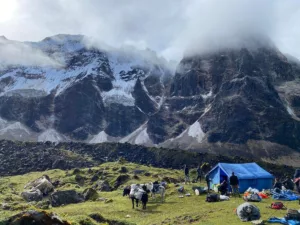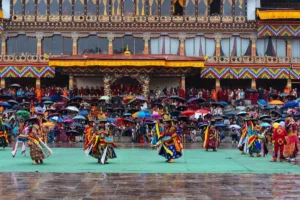Environment
Social Responsibility on Vehicles:
As the reality of a road journey is unavoidable when traveling to Bhutan, we ensure that all our vehicles meet the Emission Standards laid down by the National Environment Commission (NEC). No car in our fleet is older than 5 years and all vehicles undergo regular servicing and vehicle emission checks for Social Responsibility aligned with our company policies.
Waste Management:
We take pride in our pristine landscape and adhere to proper waste management during our trekking trips. Our guides and porters collect all waste generated during the trek and bring it back for disposal and recycling. We do not wash utensils or set up bathing tents near streams and rivers that are major sources of potable water for the people of high-alpine regions. We erect toilet tents away from water sources and cover them properly after breaking the camps. Our guides bring back all non-biodegradable waste from the trail or leave it at designated waste disposal sites. Another key point of our trekking industry is to minimize the use of plastics. We have plastic-free zones and encourage trekkers to bring their water bottles, food storage boxes, and other reusable supplies during the trip.
Social Responsibility on Preservation:
As the demand for firewood grows during the peak trekking season, tour operators procure wood for various trekking activities from local settlers who chop down more trees to meet the demand. In addition, since 70% of the country is under forest cover, bonfires lit by travelers can cause a major forest fire. We use gas stoves for cooking and do not light bonfires during the treks. Some of the ethical codes for trekkers are: not to litter, not to feed wild animals, and not to kill animals
Eco-Friendly Accommodations:
To promote low-carbon tourism, we have partnered with several eco-friendly hotels and lodges across Bhutan. These hotels use renewable energy sources and procure their supplies from local farmers who employ organic farming methods. that is much more friendly to the environment. We offer a range of activities and tours, including hiking, mountain biking, mountaineering expeditions, and cultural interactions with nomadic herders or Buddhist monks in rural areas.
Our Tours:
Our tours are the ideal balance of engagement with nature and cultural immersion. We encourage our guests to less-traveled destinations, routes, and activities to reduce pressure on popular tourist sites and the surrounding environment. We add a host of outdoor activities such as day hikes, bicycle tours, and short treks in our itineraries that not only reduce carbon footprint but also promote appreciation for Bhutan’s natural heritage. . We are committed to minimizing our environmental footprint and the impact of our tourism.
We work with local organizations and communities to raise awareness about environmental threats that affect their traditional livelihoods, engage them in implementing conservation action plans and provide sustainable livelihood opportunities. That helps them transform into a more sustainable society. We invite our guests to walk the streets of Thimphu and absorb the culture that is so prevalent in Bhutan’s capital. We offer a full-day cultural tour including visits to Buddhist temples, as well as galleries and museums in Thimphu and Paro which are dedicated to displaying Bhutanese traditional.






Social Responsibility on Employee Welfare:
Our employees genuinely love their work and want to make an impact in the workplace. Their work and experience matter to us in the ever-growing, competitive Bhutanese tourism industry. We understand that holistic employee welfare is important for any business and we constantly strive to create a good and safe work environment. To show our appreciation, we have implemented various bonus plans and welfare schemes for all our employees. Our permanent employees are part of the Provident Fund Scheme and are entitled to the company’s monthly rental allowance. We also sponsor workshops, education tours, and short-term courses for those employees who wish to broaden their knowledge.
Additionally, we regularly take our employees on holidays and tours that encourage camaraderie and team spirit. . Our employees genuinely love their work and want to make an impact in the workplace. Their work and experience matter to us in the ever-growing, competitive Bhutanese tourism industry. We understand that holistic employee welfare is important for any business and we constantly strive to create a good and safe work environment. To show our appreciation, we have implemented various bonus plans and welfare
Ethical Tourism:
- We do not employ child labor.
- We follow strict government guidelines while compensating temporary workers such as porters and cooks during treks.
- We do not arrange any illegal substance and or banned activity or entertainment for our guests.
- We follow all existing environmental guidelines in our tourism operations.
- We encourage our guests to mingle with locals and appreciate our cultural institutions but never press them to make any monetary contribution.
- We understand that the Minimum Daily Package is essential for quality tourism in Bhutan; therefore, we don’t offer any discounts on the tariffs set by the government.
- We do not employ child labor.
- We follow strict government guidelines while compensating temporary workers such as porters and cooks during treks.
- We do not arrange any illegal substance or prohibited activity or entertainment for our guests.
- We follow all existing environmental guidelines in our tourism operations.
- We encourage our guests to mingle with locals and appreciate our cultural institutions but never press them to make any monetary contribution.
